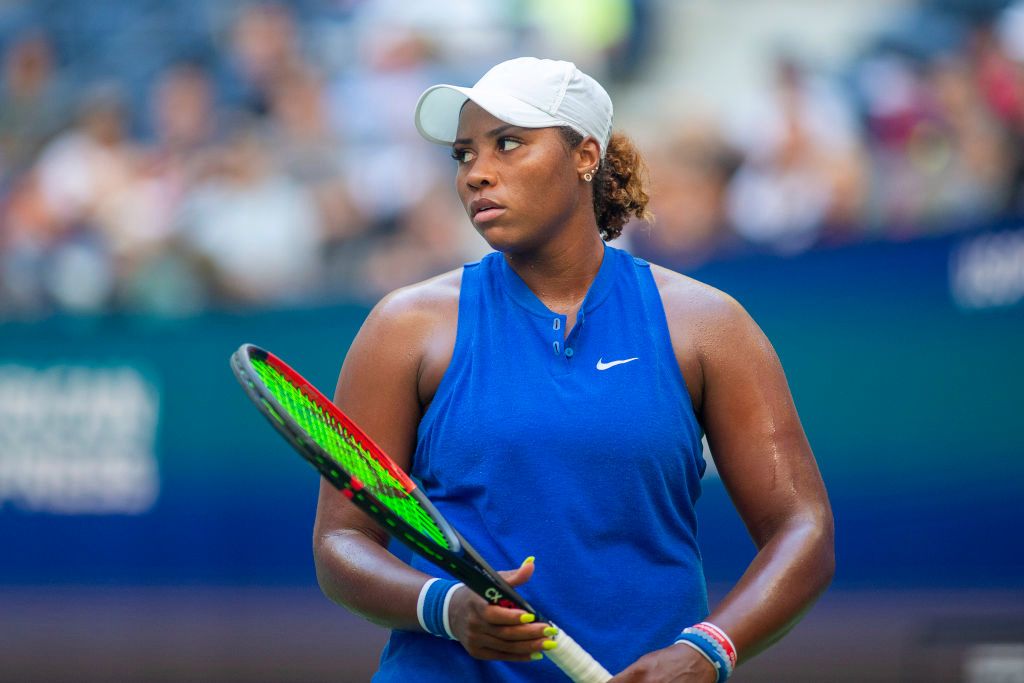
Source: Tim Clayton – Corbis / Getty
Tennis is a white man’s world. And while Black women have been present and thriving in the sport for since the forties (shout out to Althea Gibson), in recent years we’ve seen even more Black women make waves. See: Coco Gauff, Naomi Osaka, Sloane Stephens and Taylor Townsend.
As we’ve seen through the examples of Venus and Serena Williams, it’s not been an easy road to travel. There’s racism, sexism and according to a new article from Townsend fatphobia.
In a recent article for The Player’s Tribune, Townsend spoke about her journey to a professional tennis star, including the pushback she got from the United States Tennis Association who attempted to stunt her career because of her weight.
Townsend shared that the criticism of her weight began before she was even an adult. In fact, she was a 16-year-old child.
“I’m 16, I’m coming off some great results, and I’m only a few weeks from the U.S. Open.
And then…….. I get this phone call.
It was an official from the USTA. (That’s like being called to the principal’s office.) They said, “Taylor, you need to come to Florida — now. We’re putting you on an eight-week block of fitness training.”
Eight weeks of training at that time meant that Townsend would miss the U.S. Open. She shared that it hurt her to watch her friends and peers travel to New York without her.
In the midst of her fitness training hiatus, Townsend got a call from her doctor, telling her to get to the office immediately.
“My blood work came back showing that I was anemic. As in — I’d been under serious cardiovascular stress for who knows how long. I’d been playing sick, man. That’s what had been going on with me. Figuring that out was scary….. but in a way, it was also a relief at the same time??
Because it was kind of just like — okay, now we know. It’s not a fitness thing. It’s a health thing. And now we’re aware of it, and we’re about to take care of it, and….. yeah, I’ll say it: Now I can go to the Open.
They send me to a hematologist, and I ask him straight up like, ‘What’s gonna make me feel good enough to play in 17 days?’ He then explains this process of liquid iron injections. He said, ‘You’re going to feel like superwoman.’ So I called up the folks at USTA and let them know what the hematologist said. Told them I was good to go for New York. Put me in the juniors draw, put me in the main draw, put me in doubles, singles, sign me up, the whole deal.”
Still, the USTA said no despite Townsend being the number one junior in the world, despite her anemia. Townsend said she was confused and hurt by the decision.
“Sixteen years old, and getting to No. 1 in juniors as a Black girl from the South Side? I was so proud of that. I was so proud of who I was, and what I’d achieved. And I think I had it in my head, like, alright — I know I might be an outsider in this sport. I know I might not be like all these other tennis kids. But once I got to No. 1?? Once I climbed that mountain?? Now they’ll be proud to have me. Now I’ll be treated like a part of American tennis. Now I’ll be one of them.”
But it didn’t work out like that.
“It worked the way things usually work in a country that hates fat Black women.
I don’t think that’s a controversial opinion, by the way. To me, America hating fat Black women — it’s just part of life. It’s in the culture. It’s in the health-care system. You see it in Hollywood, you see it in sports. You don’t have to look around very hard. It’s everywhere.
And it’s especially everywhere in the world of tennis. I mean, think about it: They didn’t just alienate me for not fitting the “mold” of what a tennis player should look like — they punished me. They took away something I’d earned.
I was fat, and I was Black, so they took away my dream.
Or at least they tried.”
Townsend said the USTA could prevent her from getting funding but they could not keep her from playing. Townsend did just that. She made it to quarter finals in singles and she won doubles with her partner.
And during her post-game interview, when asked why she wasn’t playing with the pros, Townsend decided to tell the truth.
“I decided I wasn’t gonna let myself be embarrassed anymore — I wasn’t gonna let myself be humiliated by this rich, white tennis world that I had spent my entire childhood scraping and crawling and bending over backwards to fit into.
I took a deep breath….. and aired everything out to the press. I gave them the real. Told them what actually happened.”
Townsend shared that she was punished as a result.
“But it turns out that 16-year-old Black girls can’t take public shots at the biggest organization in American tennis and then simply go back to their business. Reporters started coming around for interviews. USTA officials came out to “clear things up.” (Translation: They basically denied all of it.) Somehow they got my mom involved. It’s like stuff just kept spiraling out of control. Like it went from not a thing, to barely a thing, to a THING, to a situation, to almost this like National Incident, so damn fast.
And it sucks, man, because I wasn’t asking for a fight. Like, my God — I wasn’t looking for beef with the freaking USTA. People understand that, right?? I wasn’t trying to “grab the spotlight,” or “put the whole system on trial,” or represent this or that.
I was just trying to speak my truth.
That’s it.
All I wanted — pretty much all I ever wanted, my whole life — was to play tennis.
But I had clearly put some powerful people in a hot pile of fiery sh*t, and brought them scrutiny they didn’t want. And that decision came with painful consequences. I mean, it’s not like anyone could stop me from playing….. but they could slowly squeeze out every drop of what I loved about playing.
I left the USTA in 2013, then turned professional in 2014 — which should have been one of the happiest moments of my life. Not a lot of people ever get to go pro at tennis….. let alone people from where I’m from. But all I can really remember about that time now is sadness. All I can really remember is this feeling that tennis wasn’t tennis anymore. It was like it had turned into this Other Bullsh*t, that just kept on collecting more and more bullsh*t.
It was like — now, for me, tennis was the feeling of getting betrayed by a bunch of people who I thought were on my team. Tennis was the feeling of being stuck with a life where answering questions about my weight in public had literally become part of my job. Tennis was the feeling of having this permanent cloud hanging over my career… before my career had even gotten started.”
Townsend shared that the whole experience was tainted and she found that she slipped into a depression. She started worrying about the way she looked until the people who introduced her to the sport came back into her life with a timely reminder.
You can read the rest of Townsend’s article here.


